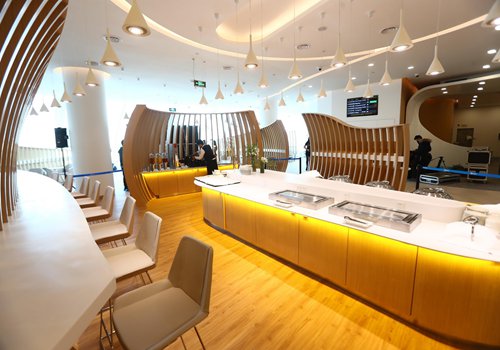
SkyTeam's new lounge in Terminal 2 of Beijing Capital International Airport. Photo: Courtesy of China Southern Airlines
SkyTeam, the global airline alliance, announced on Tuesday that it will open a lounge in Terminal 2 of Beijing Capital International Airport (BCIA) in the coming weeks, a move it said underscores its commitment to enhancing the travel experience of its top customers in the region.
The lounge's opening comes as construction gets underway on a second airport in the southern area of Beijing. SkyTeam members, including China Southern Airlines and China Eastern Airlines, are expected to move to the new airport in 2019.
The lounge
The lounge, which is the second in China and the sixth worldwide, will offer a luxurious pre-flight experience complemented by high-end amenities for first and business class passengers and elite plus members flying on any of the 12 SkyTeam airlines operating at the airport.
The 800-square meter facility has seating for 160 passengers and, in keeping with SkyTeam's lounge theme, features its signature modern curves and natural wood accents.
In a note sent to the Global Times on Tuesday, Perry Cantarutti, SkyTeam CEO and managing director, said more than 14 million SkyTeam passengers fly through Beijing each year, and the alliance will offer more branded lounges across its global network than any other airline alliance.
SkyTeam customers benefit from the alliance's more than 630 airport lounges throughout its network.
In addition to the new Beijing lounge, these include other SkyTeam-branded facilities in Dubai, Hong Kong, Istanbul, London Heathrow and Sydney.
One city, two airports
Because Beijing will soon have its second major airport, much preparation needs to be done so that two airports can operate in the capital city in a way that is both convenient for passengers and fair for airlines.
Under the plan, Air China, the country's flagship carrier, will keep BCIA as its base, and two of the other major domestic airlines, China Southern and China Eastern, will move to the new airport, which is set to open in 2019. The move is expected to take about four years.
The arrangement could help ease the current overload at BCIA, which has deprived domestic airlines of room to expand flight routes and add new flight schedules. Air China has been based in Beijing for years, but the other two carriers have had a hard time winning more slots at BCIA.
News of the arrangement sparked rumors that the separation was based on airline partner groups: Air China is a member of the global Star Alliance, while China Southern and China Eastern are part of SkyTeam.
Such an arrangement has received complaints from connecting passengers who fly the same airlines but have to cross the city to switch flights.
And an insider said another issue still needs to be addressed with the new airport is the arrangement for international flight routes.
Currently, for the same international routes, there is only one carrier that is allowed to operate, but with two airports, that might need to change.
There are arguments to be made about whether to allow more airlines to operate the same routes or keep the current arrangement.
Benefits
The three largest passenger alliances are the Star Alliance, SkyTeam and Oneworld, which account for more than half of global market share.
Under the alliances, the member airlines could enjoy easy connections to more destination around the world, and more services such as through-check-in and lounge access.
Air China has been in the Star Alliance for years. In October, Star Alliance and Juneyao Airlines formally sealed a strategic partnership to see the Shanghai-based airline become a "connecting partner" of Star Alliance in 2017.
Although the new lounge is built in Beijing, China Southern said it has still benefited from the alliance since it joined nine years ago.
In a note sent to the Global Times on Tuesday, China Southern said in the past nine years since it joined SkyTeam, the alliance has gone from zero marketing spending in the Chinese market - specifically the Guangzhou market - to constantly increasing spending, some of which targets the premium market. This marks a change in SkyTeam's view of the market and offers a great opportunity for China Southern to improve its position globally.
Wang Cong contributed to the story.

